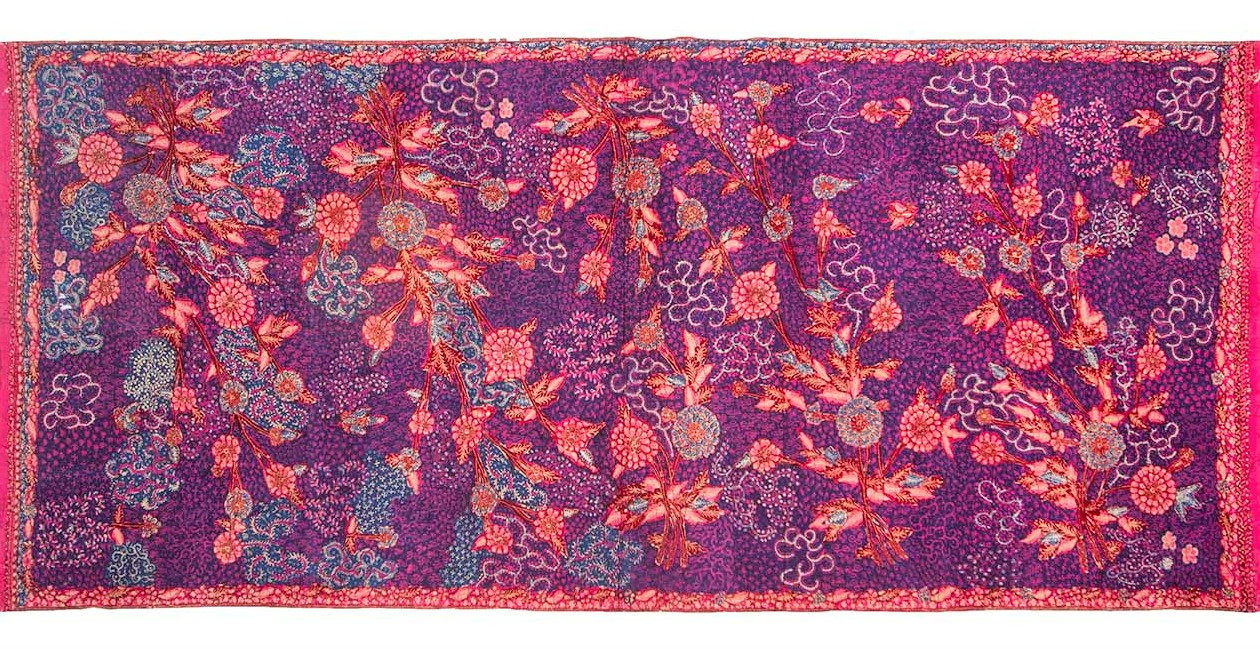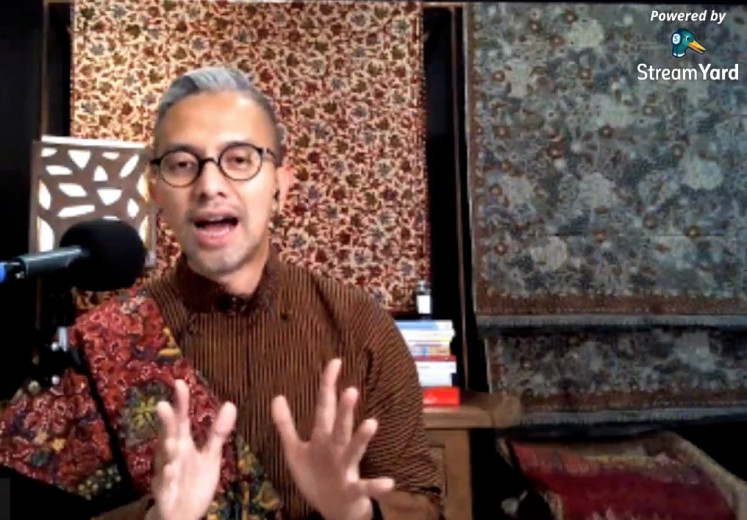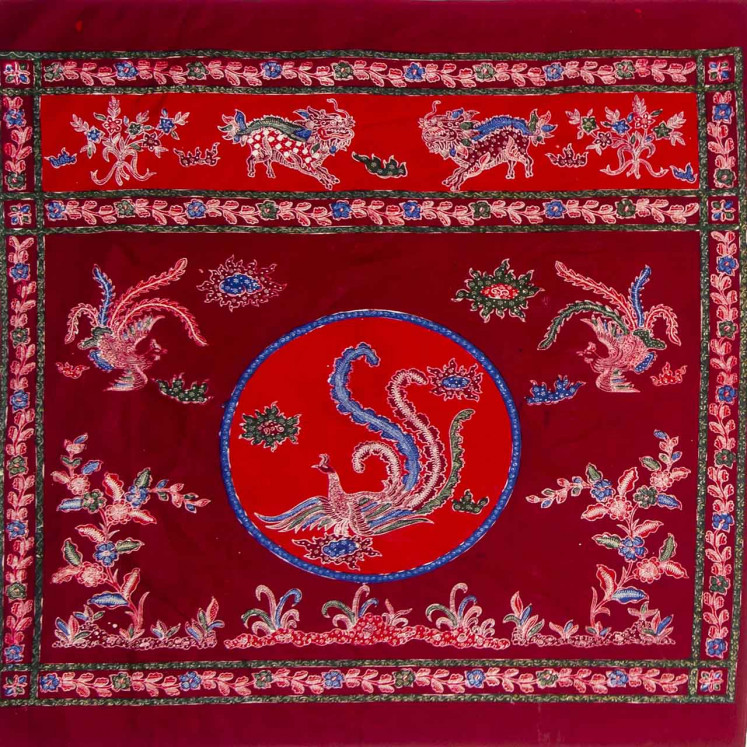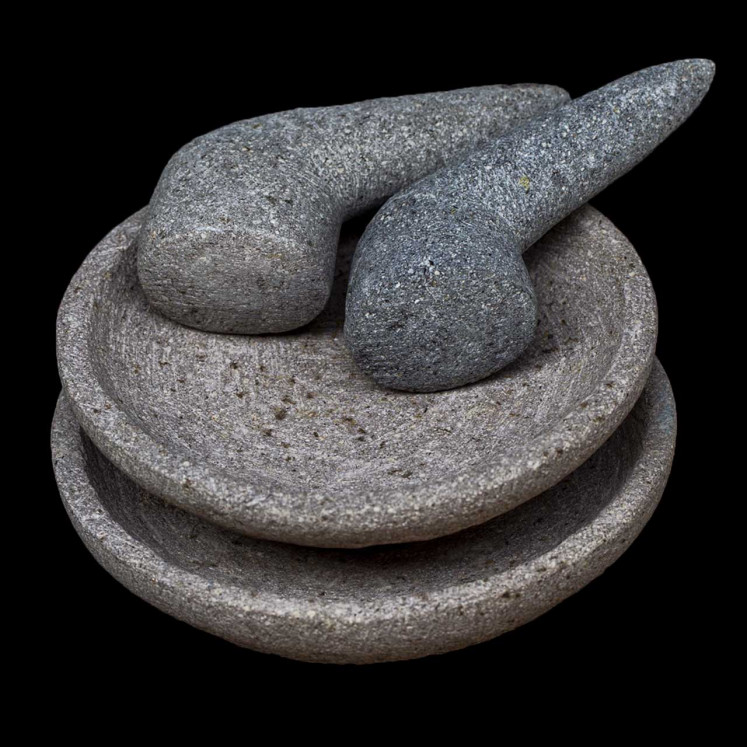Popular Reads
Top Results
Can't find what you're looking for?
View all search resultsPopular Reads
Top Results
Can't find what you're looking for?
View all search results'Pasar Rakyat Lasem' online marketplace supports batik artisans
A new online marketplace is helping batik artisans and small businesses in the Central Java town of Lasem to survive the pandemic.
Change text size
Gift Premium Articles
to Anyone
A
new e-commerce platform called Pasar Rakyat Lasem (Lasem Community Market) is the latest initiative to emerge that is supporting artisans and small businesses outride the epidemic.
Pasar Rakyat Lasem, which uses the domain name kesengsemlasem.com meaning “crazy about Lasem”, is dedicated to giving visitors a taste of the town’s unique culture.
Curated by fashion designer Didiet Maulana, the online marketplace features products under three categories: kriya (crafts), rasa (cuisines) and wastra (textiles).
Creative hero: Fashion designer and Pasar Rakyat Lasem product curator Didiet Maulana speaks during a virtual conference on the launch of the new online marketplace, which is supporting local artisans and small businesses ride out the epidemic. (Courtesy of YouTube/kesengsemlasem)
Didiet said the initiative was born out of many people’s desire to buy Lasem products, but hadn’t had a chance to visit the town.
“When the pandemic happened, we wanted to rejuvenate the existing market in Lasem [by] supporting the artisans to keep creating while allowing others to enjoy their creations at the same time,” he said at a virtual press conference broadcast via YouTube on Tuesday.
He said that the ongoing epidemic meant that people were increasingly heading online, so it was crucial to establish an online marketplace.
The platform currently offers 27 products, ranging from fish crackers to a copper teapot to a selection of batik fabrics featuring the famous tiga negeri (three nations) dyeing method.
Didiet said that curating the products presented some challenges, mainly because it was done entirely online, instead of the hands-on approach he was used to.
“However, the [online] process is rather efficient and practical. We divided the products into batches after seeing the batik cloths that arrived, so we will further curate them into several ‘episode’,” he said. “Hopefully, the first ‘episode’ will attract textile enthusiasts, as every single batik is one-of-a-kind and completely handmade.”
As for the quality of the fabrics, Didiet said he had studied Lasem batik over the years and observed artisans competing during production to produce the best textiles.
“For the first batch of textiles, they are cloths with various ‘stories’, ranging from the tiga negeri to two-color textiles, so customers can choose accordingly. We have also selected derivative products, so we have things like mukena [full prayer gown] and sajadah [prayer mats],” he said.
Future additions planned for Pasar Rakyat Lasem’s catalog include batik shirts, gift hampers and a larger range of products and prices.
Marriage of cultures: This 'tokwi' (altar runner), produced using the batik 'tulis' technique of hand-applied wax, features patterns inspired by Chinese motifs, including two facing dragons in the upper frame and a central motif of a phoenix. Lasem batik is known for blending Indonesian and Chinese cultural elements. (Courtesy of kesengsemlasem.com/-)The most affordable textile product in the current catalog is a bandana made of batik tulis (batik with hand-drawn patterns) dyed using the traditional Bangbiron red-and-blue color scheme, which carries Rp 325,000 (US$21.95) price tag.
On the other end of the spectrum is a Lokcan (blue silk) batik fabric that is priced Rp 10.5 million. The textile is produced using the meticulous and traditional preproduction process called kethelan before dyeing in a vat of castor oil for 30 days.
Pasar Rakyat Lasem is a community enterprise that is supported by Kesengsem Lasem and the Lasem Heritage Foundation. Still, Didiet said the platform would certainly welcome the government’s support.
Gilang Surya Saputra of the Lasem Heritage Foundation said it was working with local businesses interested in selling their products on the platform.
“We first mapped out the local businesses for our team to visit them and look for suitable products for the [platform]. Those interested can contact us through kesengsemlasem.com, as we want to support local businesses affected by the pandemic,” he said.
Traditional: This mortar and pestle is created by artisans from the village of Warugunung in Lasem, Central Java. They have honed their skills with natural rocks since the 19th century. (Courtesy of kesengsemlasem.com/-)The launch of the initiative is timely, as the businesses are experiencing a drop in sales due to the restrictions on intercity movement that has effectively brought tourism to a grinding halt.
Santoso Hartono, a businessman who specializes in Lasem batik, said that the COVID-19 outbreak had practically halted all sales of his products, as 40 percent of his customers were visitors on weekend jaunts.
“The restrictions on transportation have obviously affected business, but online sales through platforms like Instagram and Facebook provide some relief. To be completely honest, many batik artisans in Lasem are taking a break, although some are still working to complete existing orders,” he said.
During his 15 years in the business, Santoso said he never worried about paying his employees the annual holiday bonus (THR), the revenues for which came from sales during cultural bazaars. But these bazaars were now on hold, which added pressure to artisans and the local batik industry.
The company was thus offering its products through Pasar Rakyat Lasem. Santoso hoped that doing so would provide a bit of relief, since the platform had wider customer reach.
“We hope that the products from Lasem will sell well, so we can keep producing. Now the challenge is finding more products to highlight,” he said. (ste)














